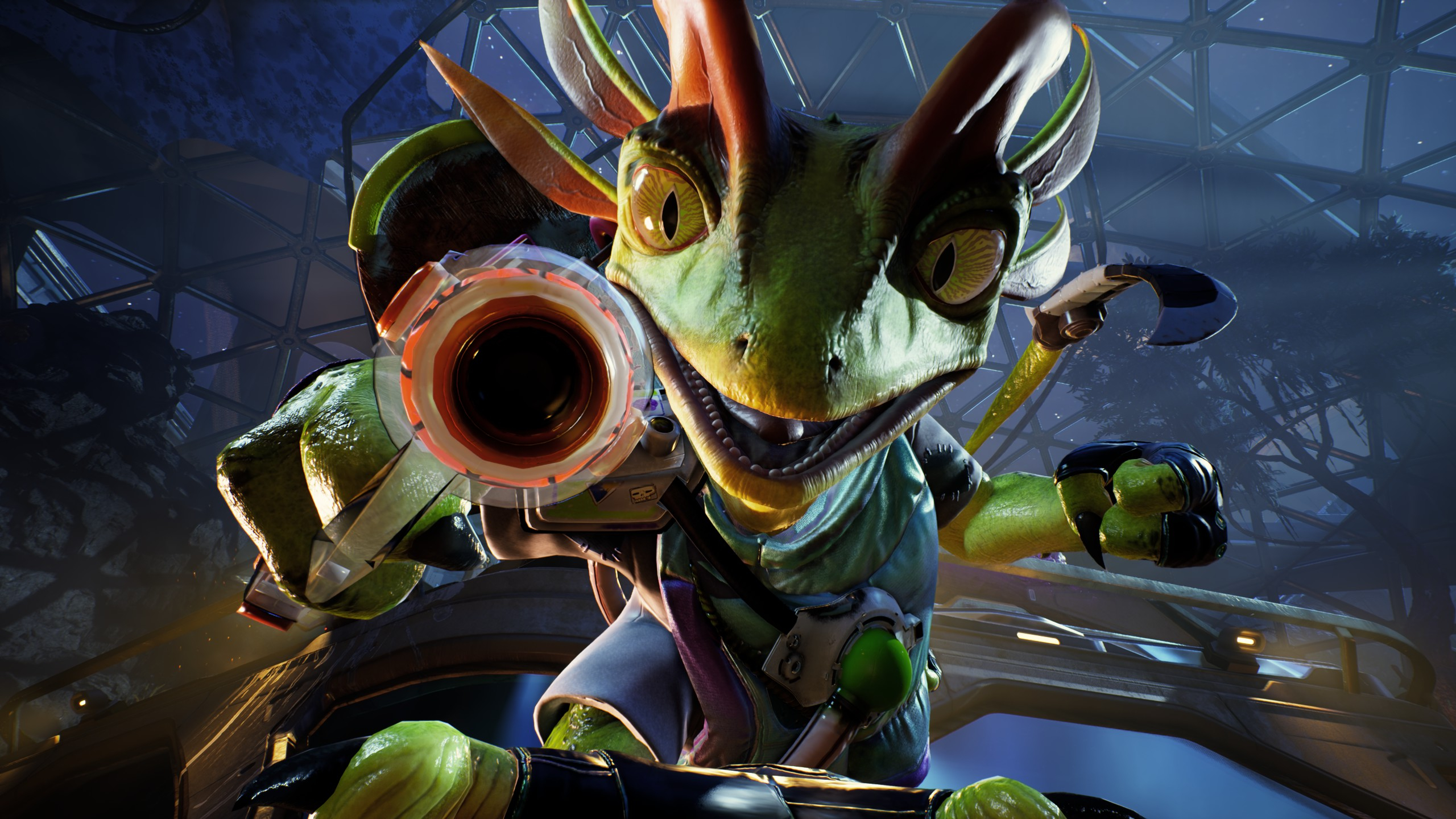Arrowhead CEO wades into the messy Arc Raiders AI debate: 'Would it have been better if Arc Raiders failed and it didn't use AI?'
Jorjani pushes back against extreme reactions to AI and wants a more nuanced discussion.

Keep up to date with the most important stories and the best deals, as picked by the PC Gamer team.
You are now subscribed
Your newsletter sign-up was successful
Want to add more newsletters?

Every Friday
GamesRadar+
Your weekly update on everything you could ever want to know about the games you already love, games we know you're going to love in the near future, and tales from the communities that surround them.

Every Thursday
GTA 6 O'clock
Our special GTA 6 newsletter, with breaking news, insider info, and rumor analysis from the award-winning GTA 6 O'clock experts.

Every Friday
Knowledge
From the creators of Edge: A weekly videogame industry newsletter with analysis from expert writers, guidance from professionals, and insight into what's on the horizon.

Every Thursday
The Setup
Hardware nerds unite, sign up to our free tech newsletter for a weekly digest of the hottest new tech, the latest gadgets on the test bench, and much more.

Every Wednesday
Switch 2 Spotlight
Sign up to our new Switch 2 newsletter, where we bring you the latest talking points on Nintendo's new console each week, bring you up to date on the news, and recommend what games to play.

Every Saturday
The Watchlist
Subscribe for a weekly digest of the movie and TV news that matters, direct to your inbox. From first-look trailers, interviews, reviews and explainers, we've got you covered.

Once a month
SFX
Get sneak previews, exclusive competitions and details of special events each month!
Another week, another flare up in the AI discourse. Spurred on by Eurogamer's fascinating, polarising Arc Raiders review (penned by PC Gamer contributor Rick Lane), Arrowhead CEO Shams Jorjani gave his take on the game's use of AI, the broader discussion surrounding the technology, and how it relates to Helldivers 2.
Speaking on The Game Business Show, Jorjani tries to find the middle ground, even though Helldivers 2 doesn't use generative AI or machine learning.
"We're waiting for the courts to decide what is fair use and not," he says. "There may be some similarities to the whole 'It's so over, we're so back' black and white takes, and I find that anything that is AI related debate in the games industry ends up being on both ends of the spectrum.
"Either we have Square Enix executives talking about 77% [the actual number it gave was 70%] being automated through QA, or we have developers who feel that their livelihood or the very fabric of their being is being threatened, and therefore all AI is bad AI. Could it be that reality is somewhere in the middle?"
Jorjani also makes a comparison between AI and more conventional middleware "that automates loading and other assets that used to be made by hand before", noting that it didn't cause a massive outcry. Though he acknowledges that it didn't have the same scale as AI use.
On Arc Raiders specifically, Jorjani thinks "it's an interesting use case that actually makes gaming better". Jorjani is referring to Arc Raiders' use of AI to generate raider voices for players who don't want to use their own voice in proximity chat, though most criticism levelled against Arc Raiders is aimed at its use of AI in generating voice lines for NPCs.
Any discussion of Arc Raiders' use of AI is also inherently fuzzy because Embark's statements on how AI has been deployed have muddied the waters, with the developer frequently contradicting itself.
Keep up to date with the most important stories and the best deals, as picked by the PC Gamer team.
Even as someone who mistrusts AI, or at least the way that it's used to sidestep creatives or scrape the internet for art, I agree with Jorjani that this, specifically, is a good use of AI. "I don't do voice in games because I'm Swedish," he says. "Communicating directly with people I don't know is very scary, I don't want to put my voice out there with my accent or whatever it is. I think this allows more people to connect with each other, which is ultimately a good gaming thing."
I don't think many would disagree, especially given how toxic videogame communities can be. If you've got a feminine voice, for instance, there's a good chance you're going to deal with harassment just for existing. So yeah, good stuff, but not what people were criticising Arc Raiders for—including the Eurogamer review.
"Let's just make sure people are paid for their work," Jorjani adds. "Surely there's a middle ground here. Come on."
The discussion then moves onto the cost—both in terms of the human cost of AI, and how it puts creatives out of a job, but also the cost of game development, and how studios can save money by deploying AI tools.
"Would it have been better if Arc Raiders failed and it didn't use AI," Jorjani asks. "That's maybe a false comparison, but on some level it's… progress is what progress is." He also pushes back against the idea that some developers are completely against AI. "Like anyone who's in any level of production, you're always looking at ways to create more efficiency, reduce the stuff you don't want to do, so you can do more of the stuff you want to do."
The problem with the AI debate is that people frequently come at it from completely different ideas of what AI is. When I criticise AI, I'm usually tackling stuff like art generation or replicating voices, instead of paying artists and performers. Because not only is it insulting to creatives and putting jobs at risk, it's also usually pretty bad. The voice acting is wonky, the art is full of errors and hallucinations. The same goes for AI-generated articles. We end up with nonsense.
That's very different from what we traditionally referred to as AI in gaming, which started out just as enemy or NPC AI, but then grew to include stuff like AI upscaling, which has been used by both modders and developers for years (with mixed success). I also use AI to transcribe interviews for me, because that cuts out hours of work and is good enough now that it's better at doing it than I am. But I still conduct the interviews, they're still my questions, and I'm still writing the article the quotes are going into.
"That nuance is lost," Jorjani claims. "Sometimes we don't end up with 'Let's remove the stuff that nobody wants to do,' and instead it's like 'All AI is bad AI.' And we have a very similar approach. We don't put any AI in the games, but if it can allow me to do my receipts, then that's more Helldivers for everyone."
Jorjani is approaching strawman territory here, because I've never seen anyone in the industry seriously suggest that every single use of AI is bad. Nobody is coming to take Jorjani's accountancy software away from him.
Regardless, it's an interesting chat, even if it mostly just goes to show how we haven't really figured out how to discuss AI yet. It means so many different things, and so many of them are completely unrelated, that there's no obvious way to debate the use of AI without filling the debate with a million caveats.
At least this will all be resolved if the AI bubble bursts.

Fraser is the UK online editor and has actually met The Internet in person. With over a decade of experience, he's been around the block a few times, serving as a freelancer, news editor and prolific reviewer. Strategy games have been a 30-year-long obsession, from tiny RTSs to sprawling political sims, and he never turns down the chance to rave about Total War or Crusader Kings. He's also been known to set up shop in the latest MMO and likes to wind down with an endlessly deep, systemic RPG. These days, when he's not editing, he can usually be found writing features that are 1,000 words too long or talking about his dog.
You must confirm your public display name before commenting
Please logout and then login again, you will then be prompted to enter your display name.

